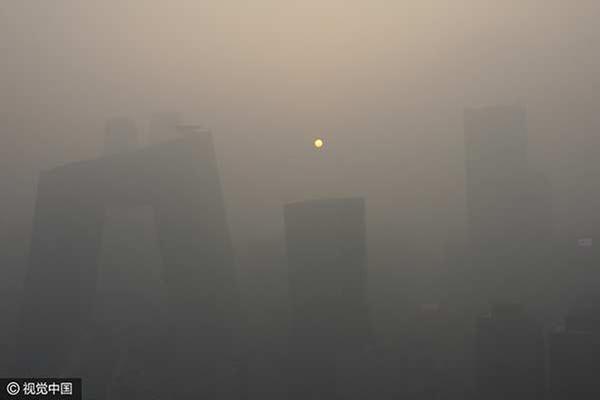Winter weather conditions could lead to worsening smog in Beijing

 |
| The China Central Television (CCTV) headquarters (left) is obscured by severe smog in Beijing on Nov 4, 2016. [Photo/VCG] |
Winter weather conditions that prevent air pollutants from dispersing in Beijing could be affected by climate change and lead to longer and more frequent periods of smog, scientists have found.
Conducive weather conditions are a key contributor to severe haze, when PM2.5 — fine particulate matter measuring 2.5 microns or less in diameter — harms health and causes economic disruption, according to the Qingdao National Laboratory for Marine Science and Technology.
As global warming causes large-scale circulation changes, the frequency and duration of such weather will increase by 50 percent and 80 percent respectively between 2050 and 2099 compared with last century, a study has found.
The lab's findings were published online recently by Nature Climate Change, an international science journal.
"Although it is believed that haze is caused by pollutants from exhaust fumes and industrial emissions, the impact from weather conditions shouldn't be dismissed," said Cai Wenju, the lead author of the report.
Cai said the conducive weather conditions include weaker surface winds in the north and mid-troposphere winds in the northwest, and a stronger thermal stability in the lower atmosphere.
"These conditions are disadvantageous for driving away haze, and instead cause it to accumulate," Cai added.
The report states the predicted increase in frequency and duration is consistent with atmospheric changes brought about by global warming, such as to Arctic winds, weaker East Asian winter monsoons and faster warming of the lower troposphere.
The Qingdao laboratory is also carrying out major scientific projects, including "Transparent Ocean", in support of the accurate prediction of the marine environment and climate change.
"Haze management is a common responsibility of all countries worldwide," said Pan Kehou, secretary-general of the lab's academic committee. The lab "will take responsibility in leading and promoting internationalcooperation on energy saving and emissions reduction with scientific research institutions from other countries and regions, and in contributing to a better environment and development of ecological civilization".
Last month, the United States-based journal Science Advances published a study on China's haze.
The study said extreme haze in winter would likely occur at a higher frequency in China as a result of the changing boreal cryosphere, such as Arctic sea ice loss in the preceding autumn and extensive boreal snowfall in early winter, posing challenges for mitigating winter haze.
- A glimpse of Xi's global insights through maxims quoted in 2024
- China's 'Ice City' cracks down on ticket scalping in winter tourism
- Iron stick yams revitalize Wenxian county
- Party chief of Guilin under investigation
- Two radio telescopes put into use to support deep space exploration
- Joint action transforms Mekong region




































